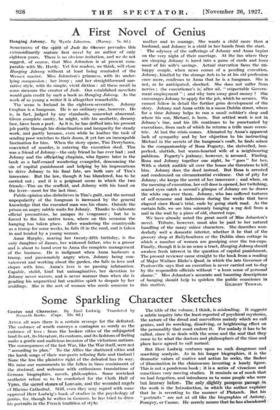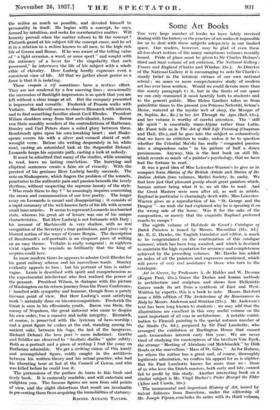Some Sparkling Character Sketches
Genius and Character. By Emil Ludwig. Translated by Kenneth Burke. (Cape. 12s. 6d.) AFTER all wars there is a certain revenge for the defeated. The embrace of wrath conveys a contagion as surely as the embrace of love ; from the broken cities of the subjugated land its art, its literature, its customs, and its fashions of feeling make a gentle and malicious invasion of the victorious nations. The consequences of the last War, like the War itself, were not " according to plan." To the Allies the shattered cities and the harsh songs of their war-poets refusing flute and timbrel None the less the plaintive right of the defeated has its way. We raise our monuments to the fallen in lines reminiscent of the denkmal, and welcome with enthusiasm translations of German biographies, novels, philosophies. Some wretched aesthetes refuse so to be comforted for the Cloth Hall of Ypres, the -saered stanes-of:Lonvain,-and -the wounded angels
of Rheims Cathedral. Still, even they May regard with some approval Herr Ludwig's- book of studies in the psychology of genius, for, though he writes in German, he has tried to draw
his portraits in-the-French tradition of stile.' 7 " • The title of the volume, I think, is misleading. It suggests a subtle inquiry into the least-reported of psychical mysteries, the nature of the dread and marvellous malady which we call genius, and its wrecking, dissolving, or heightening effect on the personality that must endure it. For malady it has to be called, since it so deals with the sense and the soul that they cease to be what the doctors and philosophers of the time and place have agreed to call normal.
But Herr Ludwig ventures upon no such dangerous and searching analysis. As in his longer biographies, it is the dramatic values of motive and action he seeks, the flashes of illumination in the chiaroscuro investing a lonely figure. This is not a ponderous book ; it is a series of vivacious and sometimes very moving studies. It reminds us of much that we had forgotten, and introduces us to some people who were but hearsay before. The Qnly, slightly pempims poss.age.,:ui the work is the Introduction, in which the author explains that he is reverting to the manner of Plutarch. But his "portraits " are not at all like the biographies of Antony, Pompey; or -Caesar: Me merely means that helms abandoned-- the milieu as much as possible, and devoted himself to personality in itself. He begins with a concept, he says, formed by intuition, and seeks for corroborative matter. Will honesty prevail when the matter refuses to fit the concept ? Plutarch gazed at his subject till the concept came, and he set it in a relation to a milieu known to all men, to the high rich life of Greece and Rome. If he was aware of the telling value of " a light occasion, a word, or some sport " and sought with the intimacy of a lover for " the singularity that each possessed," he interwove the life of his subject with a whole ethic of chivalry. Herr Ludwig hardly expresses even, a consistent view of life. All that we gather about genius as a force is that it is isolating.
These croquis d mf sometimes have a restless effect, They are not rendered by a few unerring lines ; occasionally the succession of flashlight impressions is so quick that you are left without a clear image at all. -But the company presented is impressive and versatile.. Frederick of Prussia walks with Voltaire. Machiavelli seems to observe Bismarck with interest, and to find something faMiliar about Cecil Rhodes. President Wilson shudders away from that arch-idealist, Lenin. Baron von Stein moodily wonders at the contradictions of Rathenau.. Stanley and Carl Peters share a soiled glory betWeen them. Rembrandt spies upon* his own breaking heart ; and Shake- speare covers his with a silver and vermeil shield of well- wrought verse. Balzac sits writing desperately in his white cowl, casting an astonished look at the rhapsodist Dehmel. Leonardo keeps his separate path, casting alook at nobody.
It must be admitted that many of the studies, while amusing to read, leave no lasting conviction. The hurrying and elliptical sentences create a false air of vivacity. With the greatest of his geniuses Herr Ludwig hardly succeeds. The note on Shakespeare, which fingers the problem of the sonnets, penetrates to the authentic pain and passion beneath the lovely rhythms, without suspecting the supreme beauty of the style. " Who reads them to day ? " he amazingly inquires concerning the crown and consummation of our love poetry. The longer essay on Leonardo is casual and disappointing ; it consists of a rapid summary of the well-known facts of his life with several small inaccuracies. It seems to represent Leonardo in a hurried state, whereas his great air of leisure was one of his unique characteristics. But Herr Ludwig is not fortunate with Italy ; his account of Machiavelli is very shallow, with no real recognition of the Secretary's true patriotism, and gives only a blurred notion of the ways of Cesare Borgia. The description of Rembrandt's self-portraits is an eloquent piece of writing on an easy theme. Voltaire is really congenial ; in eighteen vivid vignettes he reminds us brilliantly that the king of sceptics could love.
In more modern times he appears to admire Cecil Rhodes for his great railway scheme and his marvellous tomb. Stanley evidently appeals to him ; but his portrait of him is rather vague. Lenin is described with spirit and comprehension as the experimental intellectual who first realized the power of the peasant. President Wilson, in dialogue with the picture of Washington on his return journey from the Peace Conferenee,
handled with sympathy and humour, though from 'a purely German point of view. But Herr Ludwig's most satisfying work s naturally done on his own compatriots. Frederick the Great is seen in his effeminate youth. Baron von Stein, the enemy of Napoleon, the great 'autocrat who came' to despise his own order, has a massive and tioble integrity. Bismarck, of course, is presented with the 'lyricism of hero-worship ; and a great figure he makes at the end, standing among his ancient oaks, between his dogs, the last of the burgraves. Richard Dehmel the love poet is more indistinct. Goethe and Schiller are observed to "hesitate dislike " quite subtly. Both as a portrait and a piece of writing I find the essay on Rathenau admirable. We get a striking vision of this lonely and accomplished figure, coldly caught in the antithesis between his written theory and his actual practice, who had his liberating hour at last at the Council of Genoa, and whO was killed before he could lose it. '
The pretensions of the preface do harm to this fresh and lively book. It is eminently readable, and will entertain and enlighten you. The famous figures are seen from odd points of view, and the slight distortions that result are invaluable in preventing them from acquiring the immobilities of statuary.
RACHEL ANNAND TAYLOR.























































 Previous page
Previous page